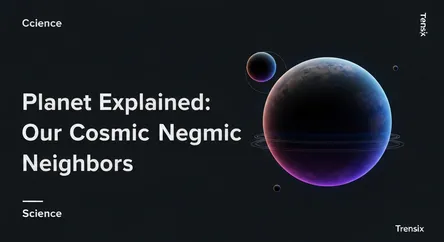Science
Planet Explained: Our Cosmic Neighbors

What defines a planet? Explore the official definition, why Pluto was reclassified, and the exciting search for new worlds beyond our solar system.
What is it?
A planet is a large celestial body that orbits a star. According to the International Astronomical Union (IAU), a celestial body must meet three criteria to be classified as a planet within our Solar System: it must orbit the Sun, be massive enough for its own gravity to make it round (hydrostatic equilibrium), and have "cleared its neighborhood" of other objects around its orbit. Our Solar System has eight official planets: Mercury, Venus, Earth, Mars, Jupiter, Saturn, Uranus, and Neptune. Worlds orbiting other stars are called exoplanets.
Why is it trending?
The topic of planets remains perpetually fascinating due to constant new discoveries. Missions like the James Webb Space Telescope (JWST) are revealing exoplanets in unprecedented detail, some with atmospheres that could potentially harbor life. The ongoing debate about Pluto's reclassification to a "dwarf planet" in 2006 also keeps the definition of a planet a hot topic in both scientific circles and popular culture, fueling discussions about how we categorize the cosmos.
How does it affect people?
The study of planets fundamentally shapes our understanding of our place in the universe. It drives technological advancements in rocketry, telescopes, and robotics. Discovering new planets, especially Earth-like exoplanets, inspires humanity and raises profound questions about the potential for extraterrestrial life. This cosmic quest not only expands our scientific knowledge but also fuels our collective imagination and encourages future generations to explore the unknown.